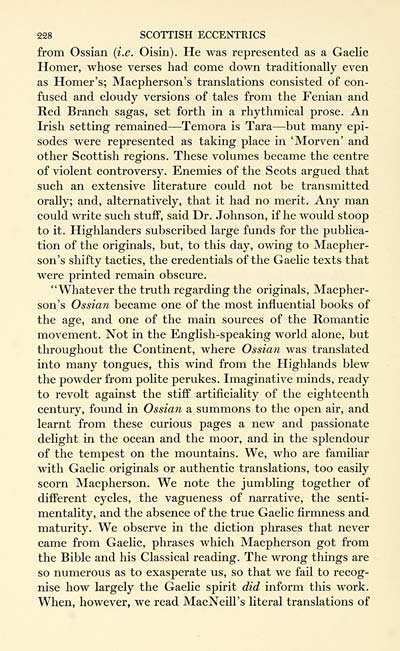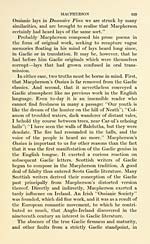Ossian Collection > Scottish eccentrics
(244)
Download files
Complete book:
Individual page:
Thumbnail gallery: Grid view | List view

228 SCOTTISH ECCENTRICS
from Ossian (i.e. Oisin). He was represented as a Gaelic
Homer, whose verses had come down traditionally even
as Homer's; Macpherson's translations consisted of con-
fused and cloudy versions of tales from the Fenian and
Red Branch sagas, set forth in a rhythmical prose. An
Irish setting remained — Temora is Tara — but many epi-
sodes were represented as taking place in 'Morven' and
other Scottish regions. These volumes became the centre
of violent controversy. Enemies of the Scots argued that
such an extensive literature could not be transmitted
orally; and, alternatively, that it had no merit. Any man
could write such stuff, said Dr. Johnson, if he would stoop
to it. Highlanders subscribed large funds for the publica-
tion of the originals, but, to this day, owing to Macpher-
son's shifty tactics, the credentials of the Gaelic texts that
were printed remain obscure.
"Whatever the truth regarding the originals, Macpher-
son's Ossian became one of the most influential books of
the age, and one of the main sources of the Romantic
movement. Not in the English-speaking world alone, but
throughout the Continent, where Ossian was translated
into many tongues, this wind from the Highlands blew
the powder from polite perukes. Imaginative minds, ready
to revolt against the stiff artificiality of the eighteenth
century, found in Ossian a summons to the open air, and
learnt from these curious pages a new and passionate
delight in the ocean and the moor, and in the splendour
of the tempest on the mountains. We, who are familiar
with Gaelic originals or authentic translations, too easily
scorn Macpherson. We note the jumbling together of
different cycles, the vagueness of narrative, the senti-
mentality, and the absence of the true Gaelic firmness and
maturity. We observe in the diction phrases that never
came from Gaelic, phrases which Macpherson got from
the Bible and his Classical reading. The wrong things are
so numerous as to exasperate us, so that we fail to recog-
nise how largely the Gaelic spirit did inform this work.
When, however, we read MacNeill's literal translations of
from Ossian (i.e. Oisin). He was represented as a Gaelic
Homer, whose verses had come down traditionally even
as Homer's; Macpherson's translations consisted of con-
fused and cloudy versions of tales from the Fenian and
Red Branch sagas, set forth in a rhythmical prose. An
Irish setting remained — Temora is Tara — but many epi-
sodes were represented as taking place in 'Morven' and
other Scottish regions. These volumes became the centre
of violent controversy. Enemies of the Scots argued that
such an extensive literature could not be transmitted
orally; and, alternatively, that it had no merit. Any man
could write such stuff, said Dr. Johnson, if he would stoop
to it. Highlanders subscribed large funds for the publica-
tion of the originals, but, to this day, owing to Macpher-
son's shifty tactics, the credentials of the Gaelic texts that
were printed remain obscure.
"Whatever the truth regarding the originals, Macpher-
son's Ossian became one of the most influential books of
the age, and one of the main sources of the Romantic
movement. Not in the English-speaking world alone, but
throughout the Continent, where Ossian was translated
into many tongues, this wind from the Highlands blew
the powder from polite perukes. Imaginative minds, ready
to revolt against the stiff artificiality of the eighteenth
century, found in Ossian a summons to the open air, and
learnt from these curious pages a new and passionate
delight in the ocean and the moor, and in the splendour
of the tempest on the mountains. We, who are familiar
with Gaelic originals or authentic translations, too easily
scorn Macpherson. We note the jumbling together of
different cycles, the vagueness of narrative, the senti-
mentality, and the absence of the true Gaelic firmness and
maturity. We observe in the diction phrases that never
came from Gaelic, phrases which Macpherson got from
the Bible and his Classical reading. The wrong things are
so numerous as to exasperate us, so that we fail to recog-
nise how largely the Gaelic spirit did inform this work.
When, however, we read MacNeill's literal translations of
Set display mode to: Large image | Transcription
Images and transcriptions on this page, including medium image downloads, may be used under the Creative Commons Attribution 4.0 International Licence unless otherwise stated. ![]()
| Early Gaelic Book Collections > Ossian Collection > Scottish eccentrics > (244) |
|---|
| Permanent URL | https://digital.nls.uk/81911272 |
|---|
| Description | Selected books from the Ossian Collection of 327 volumes, originally assembled by J. Norman Methven of Perth. Different editions and translations of James MacPherson's epic poem 'Ossian', some with a map of the 'Kingdom of Connor'. Also secondary material relating to Ossianic poetry and the Ossian controversy. |
|---|
| Description | Selected items from five 'Special and Named Printed Collections'. Includes books in Gaelic and other Celtic languages, works about the Gaels, their languages, literature, culture and history. |
|---|

